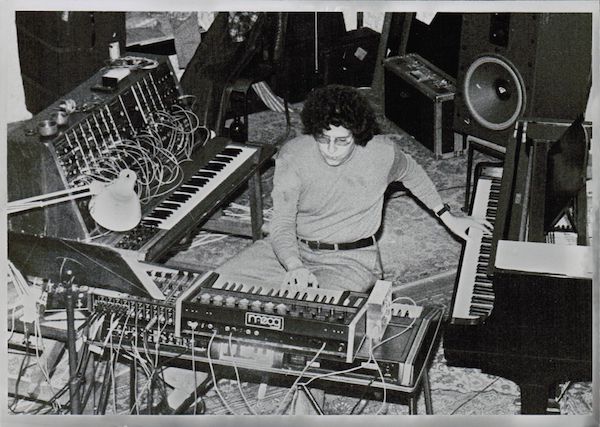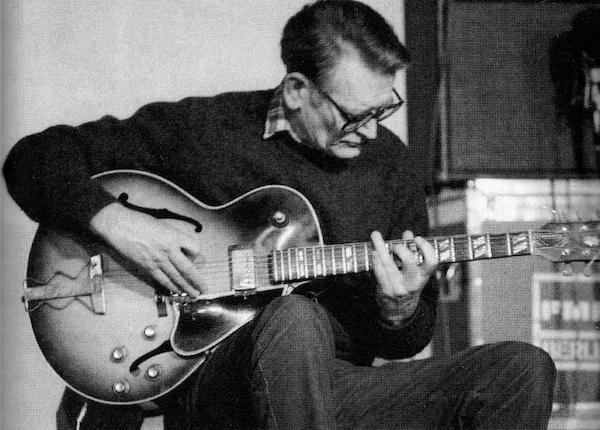The anti-predictable guitarist with paratactical electronics.
Derek Bailey’s music drew upon a vast array of resources, including indeterminany, rock & roll, and various world musics. The essential element of his work, however, is the type of spontaneous musical interrelation that evolved from the ’60s jazz avant-garde. Sound, not ideology, was Bailey’s medium. Bailey began playing conventional jazz and commercial music professionally in the ’50s. In the early ’60s, Bailey played in a trio called Joseph Holbrooke, with drummer Tony Oxley and bassist (and later renowned classical composer) Gavin Bryars. In the course of its existence, from 1963-1966, the group evolved from playing relatively traditional jazz with tempo and chord changes, to playing totally free. In 1966, Bailey moved to London; there, he formed a number of important musical associations with, among others, drummer John Stevens, saxophonist Evan Parker, trumpeter Kenny Wheeler, and bassist Dave Holland. This specific collection of players recorded as the Spontaneous Music Ensemble, which served as a crucible for the sort of egalitarian, collective improvisation that Bailey was to pursue from then on. In 1968, Bailey joined Oxley — another musician interested in new possibilities of sound generation — in whose sextet he remained until 1973. In 1970, Bailey formed the trio Iskra with bassist Barry Guy and trombonist Paul Rutherford. Also that year, Bailey started (with Parker and Oxley) the Incus record label, for which he would continue to record into the ’90s. In 1976, Bailey founded Company, a long-lived free improv ensemble with ever-shifting personnel, which has included, at various times, Anthony Braxton, Han Bennink, Steve Lacy, and George Lewis, among others.
The ’80s saw Bailey collaborating with many of the aforementioned, along with newer figures on the scene such as John Zorn and Joelle Leandre. Solo playing has always been a particular specialty, as have (especially in recent years, it seems) ad hoc duos with a variety of associates. Bailey later recorded an uncompromising three-disc set with a group that included the usually more pop-oriented guitarist Pat Metheny. Bailey’s extreme radicalism makes for a difficult music, yet there’s no doubting his influence; his methods, and aesthetic have significantly impacted the downtown New York free scene, though many (if not most) of his disciples are little known to the general public. In 1980, Bailey wrote Improvisation: Its Nature and Practice, an informative and undervalued volume on various traditions of improvised music. Bailey died in December of 2005. —Bio as of 2019
Richard Teitelbaum is well known for his pioneering work in live electronic music, and his early explorations of intercultural improvisation and composition. He received his masters degree in theory and composition from Yale in 1964. After continuing his composition studies with Luigi Nono on a Fulbright in Italy, he co-founded the pioneering live electronic music group Musica Elettronica Viva (MEV) with Frederic Rzewski and Alvin Curran in Rome in 1966, bringing the first Moog synthesizer to Europe the following year. He has performed his works at Berlin’s Philharmonic Hall, the Concertgebouw in Amsterdam, Almeida Theater and South Bank in London, the Pompidou Center in Paris, the Kennedy Center in Washington, and in concerts and festivals throughout Europe, North America, East Asia and Latin America. He has been commissioned by leading performers, including pianists Aki Takahashi and Ursula Oppens. In 2002 he received a Guggenheim fellowship to create Z’vi, the second opera in a projected trilogy dealing with Jewish mystical expressions of redemptive hopes.
Teitelbaum has received numerous awards, included a Guggenheim in 2002 to create his opera Z’vi, as well as two Fulbrights, and grants from the National Endowment for the Arts, New York State Council on the Arts, New York Foundation for the Arts, The Rockefeller Foundation, the Asian Cultural Council, and commissions from several German radio stations, the Venice Biennale, Meet the Composer/Readers Digest, and the Mary Flagler Cary Trust. In addition to Blends (New Albion), his many recordings include: Golem: an Interactive Opera, on Tzadik; The Sea Between with Carlos Zingaro, on Victo; Live at Merkin Hall with Anthony Braxton on Music and Arts; Concerto Grosso, for Human Concertino and Robotic Ripieno, on Hat Art; and Spacecraft with Musica Elettronica Viva, on Alga Marghen. —Bio as of 2005


